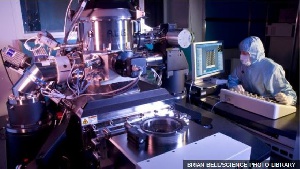By Seshie Stanley
Some say that science only makes you know. Well, that is partly true because Nature forbids absolute knowledge of itself. Whatever science leads you to know equally informs a belief about what to expect and how the universe probably works as well. That means science, with its accruing knowledge, equally engenders a belief about the universe. It is a naïve appreciation if not understanding of science to insist it does not engender belief.
To many, science is observational and reproducible knowledge. Hence, it is empirical. As important as empiricism is, it is not its primacy if explication of the universe and life is the ultimate pursuit. If it were to be that, then, questions of origin and many would legitimately be outside the domain of science since they are intrinsically unobservable and irreproducible.
Accordingly, science is certainly much more than this unrefined empiricism. Logical and mathematical consistency is the primacy of science. Let me use the heliocentric model to illustrative the point.
Empirically, the earth is seemingly fixed and unmovable. We watch the rising and setting sun. Geocentricism is the belief anchoring on that empiricism that the Earth is stationary and orbited by other heavenly bodies. It also explains some of the observed astronomical phenomena such as the occurrence of seasons. Yet a further analysis of the data of the heavenly motions increasingly brings geocentricism into disrepute. It had to be discarded in favor of the heliocentric model. Wherein the sun and not earth is at the center and orbited by other heavenly bodies and their moons within our reach of observation.
The consistent interpretations of the accruing astronomical data jettisoned the Aristotelian science of different laws governing the heavens and earth. Galileo’s crude telescope used to see the moons of Jupiter orbiting it and spots on the sun, and later supernova (explosions of stars thought to be immutable), all inexplicable by the geocentric model were all helpful in deducing that the heavens equally undergoes the same destructive changes, contrary to the claims of Aristotle and the religious organizations.
Finally, Isaac Newton unites the heavens and earth via the universal law of gravitation. That means the apple and the heavenly bodies are all falling, subjected to the same force of gravity. From then on, the centrality of the Earth in the solar system enshrined in the minds of the people by the geocentric model evaporated intellectually. The Copernican revolution was born in its place. Nevertheless, this intellectual triumph, the Copernican revolution was not an empirical knowledge over geocentricism either. None of the leading proponents travelled to space to verify it observationally. It was a mathematical knowledge.
Even in 21st century with our highly technological and space age wherein men travel to space and many satellites and telescopes are stationed up there, we are yet to have a real empirical video of the earth going round the sun. The state-of-the-art technologically equipped International Space Station is yet to give us that desirable
view if it can. The inability is understandable. The Earth is about 150 million kilometers away from the sun. To empirically observe the earth going round the sun with a bird’s eye view would require putting the recording instrument beyond that distance to form a conical structure with the earth and sun assuming the exclusion of other heavenly bodies.
Just as to have bird’s eye view of an entire football stadium and its environs require that the plane carrying the camera hover above it at a height capable of attaining that view. Yet, notwithstanding that inability, the simplicity with which the heliocentric model explains almost all observations adduces its veracity. In other words, strictly speaking, the preference of the heliocentric model over that of the geocentric in explaining the structural arrangement of the solar system was mathematically adduced than empirically induced from its conception to date.
That means the unreasonable effectiveness of mathematics in helping humanity penetrate the labyrinths of the universe enjoin us to believe that the earth indeed goes round the sun than otherwise suggested by (commonsense/unrefined) empiricism. It is a mathematical knowledge. In sum, there is belief in science as well. Science engenders belief. Just that because it is the hub and nub of rigorous ratiocination than others, we believe ceteris paribus that the informed belief is closer to reality, for that matter the truth of the Universe.
FB: STANLEY SESHIE
Whatsapp: 0248412308
Email:seshiehanku@gmail.com
Opinions of Tuesday, 27 December 2016
Columnist: Seshie, Stanley














